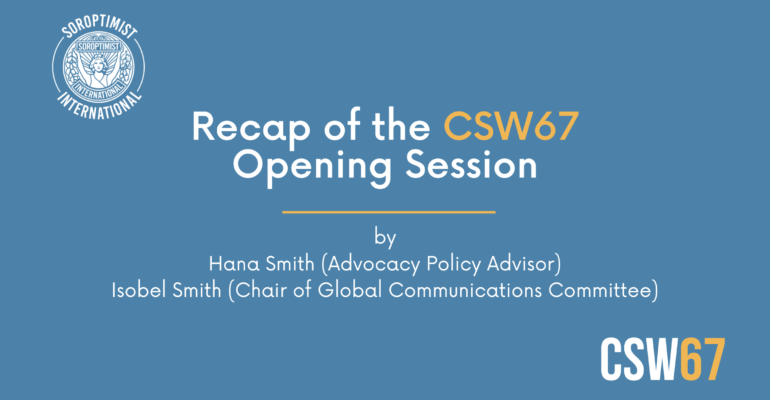CSW67 has officially begun!
The opening session, held on Monday 6 March, was Chaired by H.E. Ambassador Mathu Joyini of South Africa. Other keynote speakers included United Nations (UN) Secretary-General António Guterres, UN Secretary-General’s Envoy on Technology, Mr. Amandeep Gill, Executive Director of UN Women, Ms. Sima Sami Bahous, and representatives from Member States.
This year’s priority theme “Innovation and technological change, and education in the digital age for achieving gender equality and the empowerment of all women and girls” could not be more timely.
Ms. Bahous rightly highlighted that “the digital divide has become the new face of gender inequality”. Climate change, widespread conflicts, and the global COVID-19 pandemic have magnified and widened existing inequalities facing women and girls, to the point that the human rights of thousands of women have been entirely “erased from society”, and women and girls are often brutally suppressed while speaking out online.[1]
That is why speakers called upon the urgent need for/to:
- Public and private sectors to invest critical funding into gender inclusive innovation, technology, and feminist organisations – only 1.9% of funding currently reaches grassroots organisations;
- Guarantee all women and girls, including the most marginalised e.g., young rural women and LGBTQIA+ communities, and those disproportionately impacted by climate change and conflict, safe and affordable access to digital technologies;
- Principles of inclusion and intersectionality to be placed at the core of digitalisation;
- Greater accountability and monitoring mechanisms to ensure the safeguarding of women and girls online;
- The Commission to reaffirm the existing legal normative framework on equal rights for women and protection against discrimination and the rights of the child; and
- Debunk harmful gender stereotypes surrounding women and girls, confront misinformation and unconscious bias
Each of the speaker’s pleas was a resounding echo of those who had spoken before: if we do not urgently address the misogyny embedded in the Silicon Valleys of this world, severe harm will be done to the gender equality movement at large.
President of the UN General Assembly, H.E. Csaba Kőrösi highlighted that a staggering USD $1 trillion of global GDP has been lost due to the lack of women in tech and STEM careers. The digital sector must therefore become wholly inclusive of women and girls.
Adequate funding and resources would allow women to become educated in IT skills, empowered as leaders, and enable them to meaningfully contribute to the necessary feminisation of the digital world, including a shift in the design of digital products so they are accessible to all women.
Today, our world faces a polycrisis[2], but the meaningful and safe inclusion of women and girls in all digital spaces, including AI, has the potential to propel the economy, sustainable development, and ultimately help us to move one step forwards towards achieving gender equality.
Over the next two weeks, this diverse and complex range of issues will be thoroughly discussed, with the objective of reaching action-oriented recommendations to ensure that digital rights are also women’s rights.
[1] 1 UN Secretary-General António Guterres, in his remarks at the Opening Session of the Sixty-Seventh Session of the Commission on the Status of Women, 6 March 2023.
[2] Term given to a series of crises which interact to create an even bigger global crisis. E.g., the compounding effects of the COVID-19 pandemic, widespread conflict, energy and climate crises.


Education in all areas for women and girls. Access to technology for them is the need of the hour.